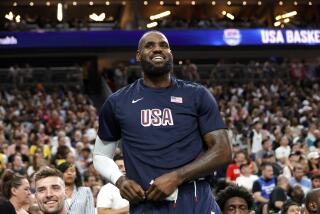NBA Searches All Over World for Talent
- Share via
Representatives of four NBA teams watched the gold-medal game at the Seoul Olympics, and the U.S. entry wasn’t even playing.
That says a lot about how far the NBA will go in search of players, and also about the caliber of those playing the game elsewhere in the world.
NBA teams hold the rights to several top foreign players, but as of yet no international star has made the move to the pros. Some, like Brazil’s Oscar Schmidt and Yugoslavia’s Drazen Petrovic, already earn NBA-like salaries playing in Europe. Others, like Soviet stars Arvidas Sabonis and Sharunas Marchulionis, can’t break from their government.
The Atlanta Hawks, who have picked as many foreigners as collegians in recent drafts, thought they had a chance to break the ice this fall and sign Marchulionis, a 6-4 left-handed guard.
Marchulionis wanted to make the move, and the Hawks believed Soviet officials were willing to let him. But after several negotiations, the Hawks were stymied to the point that Coach Mike Fratello is bitter.
“I’m mad about some of the deceit,” he said. “The way things happened it makes me think they never intended to let him go.”
One stumbling block has been the strength of the particular team to which the top foreign players are competing for.
“The reasoning for (keeping) Sabonis is that his team is the best,” said Fratello. “They win, get invited to tournaments (in Europe) and bring in money. But Marchulionis’ team isn’t that good.”
A second obstacle may be cleared next April when a vote is held that could allow pros in all international competition, including the Olympics. If the proposal passes, as most expect, then the European powers might be willing to let their stars try the NBA since Olympic eligibility wouldn’t be jeopardized.
Fratello isn’t convinced that would open the door.
“Certain ones might be allowed but they might be the lesser-type players,” he said. “They probably wouldn’t make it, and the experiment then might seem like a failure.”
Fratello’s interest isn’t entirely selfish. Marchulionis can play in the NBA, but he wouldn’t have the impact of the 7-4 Sabonis, whose rights are held by Portland. Fratello also is frustrated by good talent going to waste.
“They aren’t going to get any better without playing better competition,” he said. “If they stay where they are, they won’t be any better by the next Olympics.”
Sabonis is age 23. Marchulionis and 6-9 teammates Alexander Volkov and Valery Tikhonenko are 24.
Sabonis is good enough to be one of the top half-dozen NBA centers. He has been compared to Utah’s Mark Eaton, but Sabonis is more agile with greater offensive skills.
Marchulionis could start for several NBA teams, and Volkov and Tikhonenko would make a roster at the least.
Yugoslavia has worthy prospects also. Petrovic, a 6-5 guard, is a flashy passer and long-range shooter who could help NBA teams. Stojan Vrankovic, who the Boston Celtics have courted, is a 7-1 shotblocker who would be a decent backup. Both are 24.
Yugoslavia also has three promising younger players. Vlade Divac, a 20-year old 7-footer, is as good an athlete as ex-Syracuse star Rony Seikaly and plays better facing the basket. Dino Radja, 21 and 6-11, isn’t far behind Divac. And, 6-9 Toni Kukoc, who just turned 20, lacks only maturity and a few fundamentals to be a superstar. Kukoc combines 3-point range with skywalking dunks.
No list would be complete without Schmidt, the 30-year old Brazilian who had a record 55 points in one Olympic game and averaged more than 40 at Seoul. Schmidt’s game is one-dimensional but it’s the most important dimension in any language -- putting the ball in the basket.
More to Read
All things Lakers, all the time.
Get all the Lakers news you need in Dan Woike's weekly newsletter.
You may occasionally receive promotional content from the Los Angeles Times.







